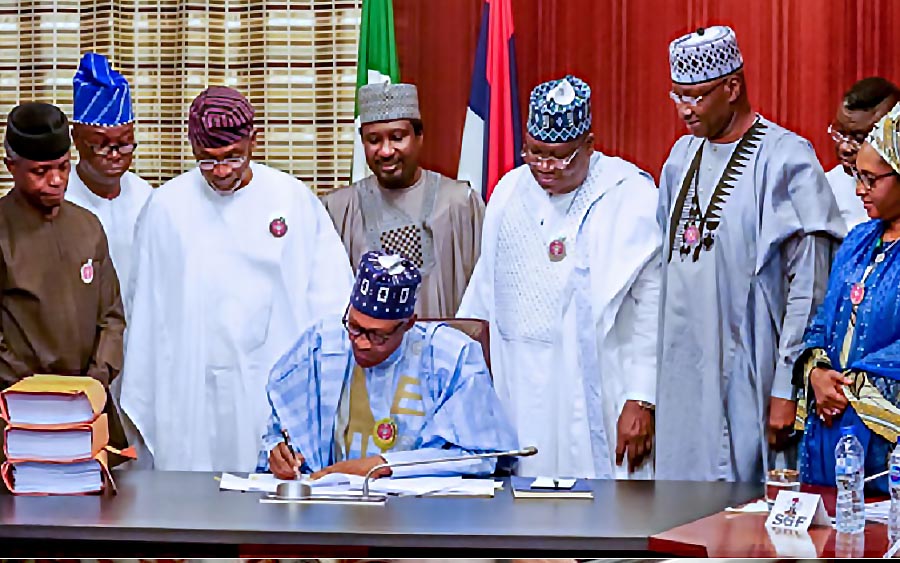The Buhari led government has spent about $3.7 billion in foreign debt service since 2015, one of the highest from any democratically elected government. The highest single-year foreign debt service was in 2006 at $1.79 billion.
About 68% of Nigeria’s foreign-denominated debt servicing is in commercial Eurobonds issues over the last two years. The loans range between 5.1% and 9.2% per annum. Nigeria’s external debt stock stood at $27 billion in June 2019.
Rising debt service: The Buhari administration has so far spent about $1.1 billion in foreign debt service this year. In 2018, the government spent about $1.4 billion in debt service, more than 3 times the $444 million it spent servicing foreign debts in 2017. The rising cost of debt service is a direct attribute of the government’s reliance on foreign loans as a means of funding government expenditure.
Foreign Loans: Nigeria’s fallen revenue following the crash in oil price has allowed President Buhari to rely mainly on foreign loans to fund government expenditure. As of June 2015, Nigeria’s foreign loans were about $10.5 billion mostly made up of multilateral and bilateral loans.
However, by June 2019, total foreign-denominated loans were $27 billion with $10.8 billion made up of Eurobonds. Commercial loans which include Eurobonds and Diaspora bonds make now make up about 42% of total foreign borrowings.
[READ ALSO: Babatunde Fowler attributes FIRS success to technological innovation (Opens in a new browser tab)]
Critics of the government have complained about the government penchant for debts believing that it could put the future of younger Nigerians in jeopardy. Supporters of the government, however, believe the borrowing was necessary to invest in critical sectors of the economy particularly infrastructure.
Recently, Director-General of MAN, Segun Ajayi-Kadir expressed worry about Nigeria’s rising debt.
“….the rising debt profile of Nigeria continues to be a cause for concern, especially the capacity of government to effectively service it and, at the same time, meet the bursting needs and aspiration of the citizenry going forward.”
“Already, our budget projections for 2020 anticipates a debt service sum of 2.45trillion, an amount higher than the 2.14 trillion earmarked for capital expenditure.
“And even though our debt-to-Gross Domestic Product (GDP) ratio, which currently stands at 28 percent, is still below the average in Africa, our revenue-to-GDP ratio remains low.”
The Finance Minister Zainab Ahmed however, believes the current debt profile is sustainable, comparing it to our GDP.
“Currently, Nigeria’s debt is at N25 trillion; that is about $83 billion. And at $83 billion, we are just at 18.99%…so 19% debt to GDP. I hear people say Nigeria has a debt problem. We don’t have a debt problem. What we have is a revenue challenge and the whole of this government is currently working on how to enhance our revenues, to ensure that we meet our obligation to service government as well as to service debt.”
[READ ALSO: Babatunde Fowler attributes FIRS success to technological innovation (Opens in a new browser tab)]
Former Vice President and defeated PDP Presidential aspirant, Atiku Abubakar during the week piled criticism on the government’s borrowing.
“I have said it time and again. The business of government is too serious to be left in the hands of politicians. We must all ask questions because if they throw away the future, it is not going to be their future they are throwing away, it will be all our futures.
“The fact that Nigeria currently budgets more money for debt servicing (N2.7 trillion), than we do on capital expenditure (N2.4 trillion) is already an indicator that we have borrowed more money than we can afford to borrow. And the thing is that debt servicing is not debt repayment. Debt servicing just means that we are paying the barest minimum allowable by our creditors.
What this means: Nigeria’s rising foreign debt profile should be a worry to investors and businesses and must be watched closely. The country’s ability to repay these loans will continue to be harder as it increases especially now that it is costing about 9%. The immediate risk for investors is the exchange rate which could be the first to suffer should the government struggle to repay its loans.
